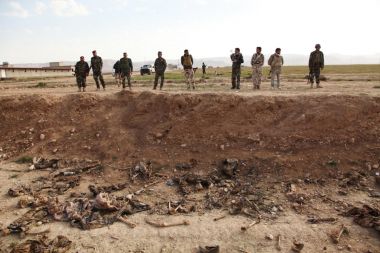Sinjar: Mass graves discovered amid accusations of 'Yazidi genocide'

Three more mass graves have been discovered in the Iraqi town of Sinjar containing between 80 to 100 bodies, officials said on Sunday.
According to the head of security in Sinjar, Qasim Simo, two graves were found to the east of the town and one within Sinjar itself.
Associated Press reported that it is expected to take months to identify the dead.
The discovery follows the uncovering of a mass grave containing at least 120 bodies and rigged with explosives 10km west of Sinjar on Saturday. Several mass graves have now been found around the town, which was attacked by ISIS militants and captured last August.
Hundreds of thousands of residents were forced to flee when Kurdish troops withdrew on August 3 2014 leaving them vulnerable to attack, and thousands were killed. Many women and girls were taken as sex slaves, and horrifying accounts have emerged of their treatment at the hands of ISIS militants.
Many who faced persecution were from the minority Yazidi group, an offshoot of Zoroastrianism, which blends ancient religious traditions with both Christianity and Islam. According to ISIS doctrine, they are "devil-worshippers".
In March of this year, the office of the United Nations High Commissioner for Human Rights said that the persecution of the Yazidi people may qualify as genocide.
Among the crimes it said had been perpetrated against the minority were the "brutal and targeted" killing of hundreds of men and boys in Ninevah province last August, and the rape of girls as young as six-years-old. Young boys have also been taken to be trained as militants.
Speaking to the BBC, an official responsible for the Sinjar region, Mahma Khalil, said that Saturday's discovery was the biggest mass grave found so far. He predicted that more mass execution sites would be uncovered in the near future, following the liberation of Sinjar from militants earlier this month.
Calling ISIS atrocities in the region a "genocide of the Yazidis," Khalil appealed for international support in compiling evidence for the International Criminal Court concerning ISIS war crimes.
At the same time Khalil told the Kurdish Shafaq News that despite the liberation of Sinjar, not all residents are eager to return home, as they remain "uncertain" about the security situation. Another reason for their hesitation is the lack of government services.
"There is no place for those who committed a crime between us," he said.
Additional reporting by Reuters











